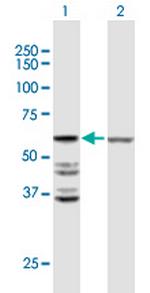Search Thermo Fisher Scientific
Product Details
H00010965-B01P
Species Reactivity
Host/Isotype
Class
Type
Immunogen
Conjugate
Form
Concentration
Purification
Storage buffer
Contains
Storage conditions
Shipping conditions
Product Specific Information
Product may be used with Western Blot (Transfected lysate).
The Isotype of this product is composed of an IgG Mixture.
Immunogen sequence: MSNKLLSPHP HSVVLRSEFK MASSPAVLRA SRLYQWSLKS SAQFLGSPQL RQVGQIIRVP ARMAATLILE PAGRCCWDEP VRIAVRGLAP EQPVTLRASL RDEKGALFQA HARYRADTLG ELDLERAPAL GGSFAGLEPM GLLWALEPEK PLVRLVKRDV RTPLAVELEV LDGHDPDPGR LLCQTRHERY FLPPGVRREP VRVGRVRGTL FLPPEPGPFP GIVDMFGTGG GLLEYRASLL AGKGFAVMAL AYYNYEDLPK TMETLHLEYF EEAMNYLLSH PEVKGPGVGL LGISKGGELC LSMASFLKGI TAAVVINGSV ANVGGTLRYK GETLPPVGVN RNRIKVTKDG YADIVDVLNS PLEGPDQKSF IPVERAESTF LFLVGQDDHN WKSEFYANEA CKRLQAHGRR KPQIICYPET GHYIEPPYFP LCRASLHALV GSPIIWGGEP RAHVMAQVDA WKQLQTFFHK HLGGHEGTIP SEV
Target Information
Acyl-CoA thioesterases (ACOTs) are a group of enzymes that catalyze the hydrolysis of acyl-CoA to form coenzyme A (CoA) and a free fatty acid. Through their catalytic activity, ACOTs are able to regulate the level of fatty acids and acyl-CoAs within the cell. ACOT1 (acyl-CoA thioesterase 1, also known as CTE1) and ACOT2 (acyl-CoA thioesterase 2, also known as PTE2) are members of the ACOT family and exhibit different cellular localization, with ACOT1 existing as a monomer in the cytoplasm and ACOT2 localized primarily to mitochondria. Characteristic of most ACOT proteins, ACOT1 and ACOT2 catalyze the conversion of Palmitoyl-CoA and water to free CoA and palmitate, a reaction that is important for the regulation of intercellular fatty acid levels. ACOT2 is expressed as multiple alternatively spliced isoforms and, like ACOT1, is encoded by a gene which maps to human chromosome 14.
For Research Use Only. Not for use in diagnostic procedures. Not for resale without express authorization.
References (0)
Bioinformatics
Protein Aliases: Acyl-CoA thioesterase 2; Acyl-coenzyme A thioester hydrolase 2a; Acyl-coenzyme A thioesterase 2, mitochondrial; CTE Ia; CTE-Ia; Long-chain acyl-CoA thioesterase 2; mitochondrial acyl-CoA thioesterase 1; peroxisomal long-chain acyl-coA thioesterase 2; ZAP128
Gene Aliases: ACOT2; CTE-IA; CTE1A; MTE1; PTE2; PTE2A; ZAP128
UniProt ID: (Human) P49753
Entrez Gene ID: (Human) 10965

Performance Guarantee
If an Invitrogen™ antibody doesn't perform as described on our website or datasheet,we'll replace the product at no cost to you, or provide you with a credit for a future purchase.*
Learn more
We're here to help
Get expert recommendations for common problems or connect directly with an on staff expert for technical assistance related to applications, equipment and general product use.
Contact tech support

